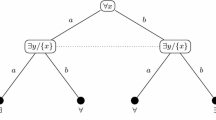Abstract
We shall introduce in this paper a language whose formulas will be interpreted by games of imperfect information. Such games will be defined in the same way as the games for first-order formulas except that the players do not have complete information of the earlier course of the game. Some simple logical properties of these games will be stated together with the relation of such games of imperfect information to higher-order logic. Finally, a set of applications will be outlined.
Similar content being viewed by others
References
Barwise, J., 1979, ‘On Branching Quantifiers in English’,Journal of Philosophical Logic 8, pp. 47–80.
Barwise, J. and Feferman, S. (eds.),Model-Theoretic Logics, Springer, Berlin, 1985.
Enderton, H. B., 1970, ‘Finie Partially Ordered Quantifiers’, inZeitschrift für Mathematische Logik und Grundlagen der Mathematik 16, pp. 393–397.
Henkin, L., 1961, ‘Some Remarks on Infinitely Long Formulas’, inInfinitistic Methods: Proceedings of the Symposium on the Foundations of Mathematics (Warsaw, 2–9 September, 1959), Pergamon Press, New York, pp. 167–183.
Hintikka, J., 1974, ‘Quantifiers vs. Quantification Theory’,Linguistic Inquiry 5, pp. 153–177.
Hintikka, J., 1979, ‘Quantifiers in Natural Languages: Some Logical Problems I’, in I. Niiniluoto and E. E. Saarinen (eds.),Essays on Mathematical and Philosophical Logic, D, Reidel, Dordrecht, pp. 295–314.
Hintikka, J. and Kulas, J. 1983,The Game of Language, D. Reidel Publishing Company, Dordrecht, Holland.
Hintikka, J. and Kulas, J. 1985,Anaphora and Definite Descriptions. Two Applications of Game-Theoretical Semantics, D. Reidel Publishing Company, Dordrecht, Holland.
Hintikka, J. and Sandu, G., 1989, ‘Informational Independence as a Semantical Phenomenon’, in J. E. Fenstadet al. (eds.),Logic, Methodology and Philosophy of Science, Vol. III, Elsevier Science Publishers, B.V., pp. 571–589.
Kolaitis, G., 1986, ‘Game Quantification’, in Barwise, K. J. and Feferman, S.,Model-Theoretical Logics, Berlin, Springer-Verlag.
M. Krynicki and Lachan, A. 1979, ‘On the Semantics of the Henkin Quantifier’,JSL 44, pp. 184–200.
Neale, S., 1990, ‘Descriptive Pronouns and Donkey Anaphora’,The Journal of Philosophy 3, pp. 115–150.
Neale, S. (forthcoming),Descriptions, MIT, Cambridge.
Sandu, G. and Väänänen, J. (forthcoming), ‘Partially Ordered Connectives.
Seuren, P. A. M., 1974, ‘Negative's Travels’, in P. M. A. Seuren,Semantic Syntax, Oxford University Press, pp. 183–208.
Stockwell, 1973, in R. P. P. Schachter and B. H. Partee,The Major Syntactic Structures of English, Holt, Rinehart and Winston, New York.
von Neumann, J. and Morgenstern, O., 1944,Theory of Games and Economic Behavior, Princeton University Press, Princeton.
Walkoe, W. Jr., 1970, ‘Finite Partially Ordered Quantifiers’, inJournal of Symbolic Logic 35, pp. 535–555.
Author information
Authors and Affiliations
Rights and permissions
About this article
Cite this article
Sandu, G. On the logic of informational independence and its applications. J Philos Logic 22, 29–60 (1993). https://doi.org/10.1007/BF01049180
Issue Date:
DOI: https://doi.org/10.1007/BF01049180




